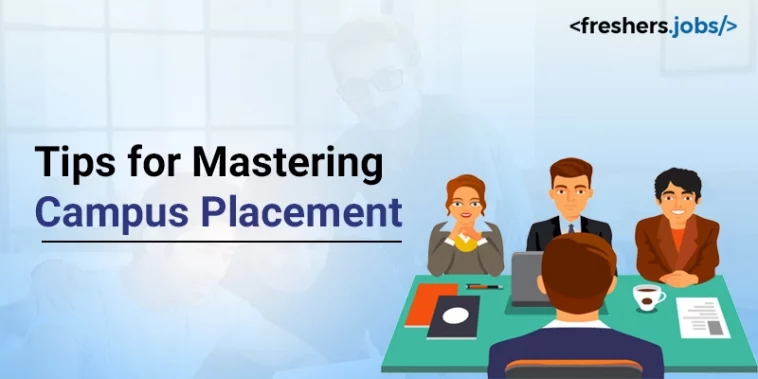If you are in the final year of your graduation and looking for campus placements, read further on the tips and knick-knacks you must know before that big day. Campus placements are certainly a competitive process, but if you arm yourself with the right preparation, you can maximize your chances of success. Let us dive in for more details in this blog.

What is Campus Placement?
Campus placement is a recruitment process where companies visit educational institutions to hire students who are about to graduate. These companies conduct various selection rounds, such as group discussions, aptitude tests, technical interviews, and HR interviews, to evaluate candidates’ skills and suitability for their open positions. Campus placements provide a valuable opportunity for students to secure employment before completing their education.
Steps Involved in Campus Placement Preparation
Foundational Preparation
To excel in your academic and technical journey, you need to maintain a strong academic record, as good grades reflect your commitment and learning ability. Focus on relevant programming languages, such as Java, Python, and C++, and practice coding on platforms like LeetCode, HackerRank, and Codewars. It’s essential to grasp core concepts in data structures and algorithms, as well as database concepts, including SQL, database design, and normalization. Familiarity with fundamental operating system concepts like memory management, process management, and file systems is also important.
Additionally, a solid understanding of basic networking concepts, such as TCP/IP, the OSI model, and network protocols will serve you well. Don’t overlook the importance of aptitude; practice quantitative aptitude in areas like numbers, percentages, profit/loss, time/work, speed/distance, and averages. Enhance your logical reasoning skills through puzzles and exercises involving data sufficiency, syllogisms, and relationships. Finally, work on your verbal ability by improving your reading comprehension, grammar, vocabulary, and sentence correction skills to ensure a well-rounded skill set.
Resume Building & Portfolio
When applying for jobs, you have to tailor your resume for each specific company and role. By customizing your resume, you can effectively clearly specify your most relevant skills and experiences that match with the job description. In addition to your resume, building a portfolio is crucial. Your portfolio should showcase your projects, internships, and any other remarkable work, and demonstrate your practical skills and problem-solving abilities. Together, a well-crafted resume along with a good cover letter, and an impressive portfolio can greatly magnify your chances of standing out to potential employers. Latest Job Alert on various software of non-software jobs are provided through training and placement companies and dedicated job portals, as they make your job search easier.
Interview Preparation
To get selected in technical interviews, you must practice coding by solving challenges on online platforms and fine-tune your whiteboard skills. Additionally, reviewing core concepts in your field will prepare you to discuss fundamental ideas effectively. Be ready to provide a deep dive into your projects, detailing the challenges you encountered and the solutions you implemented. To perform well in behavioral interviews, utilizing the STAR method can help decide your responses to common questions, such as “Tell me about yourself” and “Why do you want to work here?”. Moreover, in HR interviews, focus on your soft skills—like communication, teamwork, and problem-solving. Showcasing your research on the company’s culture, values, and recent developments helps you show genuine interest in the position.
Mock Interviews & Group Discussions for Placement Preparation
To perform well in your campus interviews and group discussions, you have to practice regularly with the help of mock interviews. This technique will definitely help you gain valuable experience and make you find areas that need extra improvement. Seek feedback from mentors, seniors, or career counselors who can provide you with inputs to refine your approach further. By combining effective practice with constructive criticism, you can boost confidence and enhance your performance in real-life scenarios. Freshers Jobs information is provided through good training institutes, social media handles and other professional job websites, to assist college freshers in finding jobs.
Some Quick Tips
To successfully bag a job, you have to stay on par and informed with the latest industry trends and technologies. It is your knowledge that improves your skills and makes you more attractive to potential employers. Networking with the right set of people plays a crucial role in this journey; You have to start attending career fairs, connecting with successful alumni, and building useful networks with professionals in your field can open doors to new opportunities in multiple sectors. Additionally, maintaining a positive attitude is vital. Stay confident and patient, enthusiastic, and persistent throughout the placement process, and it can reward you with success in securing your job.
How to Prepare for Placements
Campus placements require a multi-faceted approach. Focus on building a strong foundation by excelling in academics, developing in-demand technical and soft skills, and creating a compelling resume and portfolio. Thoroughly prepare for interviews by practicing coding, researching companies, and preparing for behavioral questions using the STAR method. Participate in model or mock interviews and group discussions to gain valuable experience. Know the industry trends, network with professionals, and portray a positive and confident attitude throughout the process. Consistent effort and a well-structured approach are key to success in campus placements.
To conclude, placement preparation becomes easy if you take your semester exams seriously, right from the first year of graduation or post-graduation. See that you score more than 75% in all subjects in all semesters. There should be no backlogs, as they are considered the biggest setback from the hirer’s point of view. Also, excellent communication skills in the English language is seen as the biggest advantage, as your personal interviews value your attitude and thoughts more. So without wasting time, keep up your hard work and never lose focus on your academic performance. Campus placements are easier than off-campus job interviews as the competition becomes intense every year.



